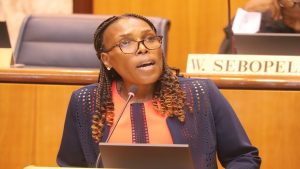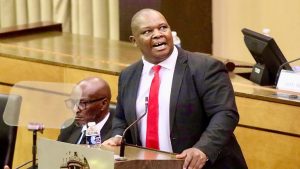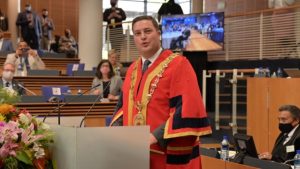Gauteng’s MEC for Finance, Jacob Mamabolo, has increased the province’s budget by R4.5 billion. The budget has been adjusted from R158.9 billion to R163.5 billion.
Mamabolo made the announcement in the 2023 Medium Term Budget Policy Statement on Tuesday. According to the MEC, the money will be used to fund energy projects and expand frontline services in townships, informal settlements and hotels.
He further says the province has been able to raise R32 billion from its own revenue sources, including hospital patient fees and vehicle licence fees.
In his Medium Term Budget Policy Statement, MEC Mamabolo says the province is intensifying revenue enhancement efforts and exploring alternatives.
Some of these enhancement efforts include a smart Driver’s Licence Testing Centre, a cashless rollout for liquor traders and new casino regulations.
“The revenue we can generate from working with Economic Development, in particular, the Gambling Board could almost be our localized version of sin taxes. There is a lot of money we are going to be getting from this; we are not giving you the figures. But this is the most exciting part. We have looked at the figures, but we then said, instead of announcing them here when we announce the budget in 2024. But I can assure you that from the casino; gambling board, looking at the licenses and the regulation, we are excited about what is going to come there,” says Mamabolo.
Mamabolo says the province is working on a plan to settle the R12.9 billion E-Toll debt and will submit a proposal to the national government next month. He is concerned about the poor performance of infrastructure expenditure.
“Our province is not doing well on infrastructure spending. We also have projects in the province that have been going on for too long. Every now and then we table projects in the booklet known as the estimates of capital expenditure; what we are saying is, that we are as Treasury going to look at how financial performance can enhance the delivery of infrastructure. So we are not just going to allocate money to departments, but we are setting up what we call the finance infrastructure lab to really look at the nuts and bolts of performance of infrastructure,” Mamabolo adds.
The province has not escaped the growth challenges seen in the overall national economy but it is still expected to grow slightly better than the national economy in 2023 and 2024. Economic growth is estimated to be marginal this year at 0. 7 % which is above the national estimate of 0.4%.
But electricity supply challenges, logistical inefficiencies and declining commodity prices are all hampering the province’s overall growth.
The province has also flagged the provincial wage bill, saying it continues to grow at an alarming rate and threatens to breach the set target ceiling of 60% of the provincial budget. This is further compounded by the current Nasi Spani recruitment drive, a brainchild of Premier Panyaza Lesufi.
Gauteng says while it recognises the provision of quality jobs and fair compensation, it warns that it is important that it does not come at the cost of compromising the province’s fiscal position.






